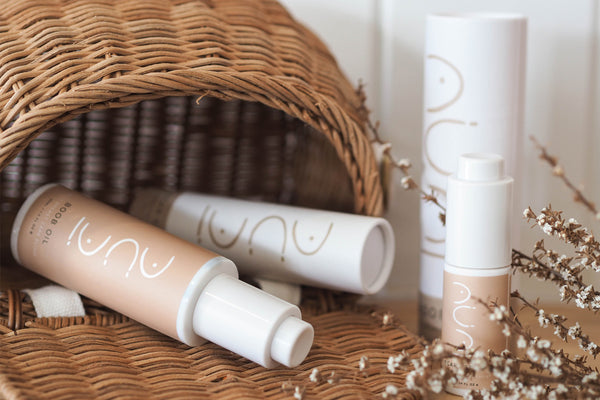
Check Yourself | with Nuni Wellness

Tell us a little about yourself and your business…
Originally from Tasmania, these days I’m lucky to call the beautiful Northern Rivers of NSW home (still defrosting) and am a Mama to two little people, Evie (6), and Roo (3). I launched my business, Nuni, in December of 2018. After my own boob health experiences, I recognised a need for someone to offer products & resources to help enhance breast wellness, connection & self-awareness in a fun, modern way. I’m really passionate about having positive conversations about how women can achieve optimal breast wellness and proactively manage their risks through self-massage.
About 10 years ago I tested positive to a gene fault called BRCA2, made "famous" by Angelina Jolie. It’s not so comfortingly referred to as the breast cancer gene, as those who carry the fault have an increased risk of developing breast cancer (up to 80% lifetime risk), and with a relatively young onset – my Nan was in her mid-thirties. Three years ago when my youngest bub was 10 months old, I underwent a risk-reduction mastectomy and reconstruction. Everyone’s journey with preventative measures is so personal, but taking this step felt right for me.
Throughout my years of research after finding out about BRCA2, I found an overwhelming lack of positive messaging around the things we can actually do to promote breast wellness; and the seed was also planted after many conversations I've had with friends and other women about the relationships (or lack thereof) they have with their boobs. I realised that someone needed to create a product to help women get in touch with their girls, and a platform to hold a conversation around breast wellness in general….and that person might as well be me. While I no longer have my boobs, I’m here to help other women keep theirs healthy and happy! My hope is that Nuni invites, inspires and informs women of all ages to take care of their breasts.

The The term "self-care" is something we are beginning to hear a lot in 2019. #selfcaresunday is even a popular hashtag on Instagram, but putting yourself first is still uncharted territory for a lot of women. What does "self-care" mean to you and what form does it take in your life?
It definitely is uncharted territory for a lot of women, and as a mum and business owner, I’m the first to admit that feelings of guilt can tend to arise when self-care comes into play, so it’s a relief to be reminded that it shouldn’t be confused with self-indulgence or selfishness. Having said that, it’s still a work in progress for me. I think that true self-care is a daily practise, rather than being something we resort to because we’re absolutely exhausted (or when we polish off a pizza and a bottle of wine and label it self-care… #guilty).
I’m learning that actual self-care has very little to do with “treating myself” and a whole lot to do with parenting myself and making choices for my long-term wellness, so for me that might look less like a bubble bath & sheet mask, and more like accepting help, or going out for a (long) drive alone just to listen to a podcast! Aside from treating ourselves to the occasional mani, I feel that tending to our physical body is a form of self-care that many women avoid, particularly when it comes to their breasts. Taking a moment to consciously care for our breasts can become a ritual in itself. Massaging our boobs is beneficial on so many levels – it promotes lymphatic drainage and increases fresh blood flow into the area, helps to decrease hormonal tenderness and improves the tone and texture of our boobs, but on a deeper level it’s also a chance to connect with ourselves and our hearts. Taoist & Tantric traditions believe there’s a strong link between the breasts and heart centre, so taking a moment to cultivate this connection can have a beautiful flow-on effect into our daily lives.
I’m excited about self-care for the collective. Any reminder to look after ourselves and inspire us to become better equipped to deal with the stressors of daily life is a great thing. From a breast health perspective, studies show that it’s not stress alone that increases the risk of breast cancer, it’s how in control we feel of that stress – or how we manage it, that makes the difference. I think that if we have more tools to counteract stress, statistics could look very different!

There is still a social stigma that exists surrounding the female body. Things like sharing photos of nipples or breastfeeding, or even talking about breasts is still strangely taboo for many. What are your thoughts on how we can strive to change these attitudes and why it's important to do so?
I think it really comes down to us as parents to be open with our children about breasts, and to try and shift the value system that is ingrained in so many of us – to cover your breasts, as bare (or scantily clad) breasts are pornographic and lewd. I’ve asked a lot of women whether they were talked to about breasts and breast wellness during their childhood / teenage years, and the resounding answer is always that boobs were "just never discussed". My six year old daughter already raises questions that challenge the logic of this societal stigma. ‘Why was that mummy feeding her baby in the public toilet?’ The fact that the most natural act in the world must be hidden from sight so as to not cause offence is absurd, especially when male nipples (which aren’t likely to be providing nourishment to a growing human anytime soon) are deemed socially acceptable.
I think we can start by cultivating a more open dialogue about our boobs, both with our children, and with other women! Truth be told we’re actually all united by boob stuff, but tend to move through these experiences alone. A lot of big feelings are associated with our boobs, stemming back to childhood and puberty, feelings which can tend to create detachment and lead us to do little more than tuck them into a bra and forget about them. More boob banter can only be a good thing!

October is Breast Cancer Awareness Month, but we believe that women's health issues such as this should be talked about year-round. What do you feel is the best way to create awareness surrounding breast cancer and keep the conversation going?
I’d actually really love to see BCA month be renamed Breast Awareness Month or even Breast Health Awareness month, a more positive spin on the same message! October is a really tough month for a lot of people - a time of heavy, hard-hitting stories, a fair bit of pink-washing, and a constant reminder for those who have been directly or indirectly impacted by breast cancer. Of course, fundraising for better testing methods and treatments is a wonderful thing, but I do wonder whether October can actually foster more fear and worry, rather than helping empower women to take a proactive approach to their breast wellness!?
Breast care doesn’t have to be a sterile monthly breast check! How uninviting is a clinical prod around in some sort of search and destroy mission - as though we’re hunting for something to be wrong!? I think that the most important thing we can all do is cultivate a regular breast care practise, so that we can feel more connected with our breasts, understand how they fluctuate throughout the month, and therefore put us in a far greater position to recognise any changes if they were to occur.
As much as I prefer to keep things light and positive, the fact is, breast cancer is on the rise. While the great news is that mortality rates are decreasing, overall occurrences are increasing. It’s actually the most commonly diagnosed cancer in women under 40, so we need to shake up the misinformed belief that it’s a disease of aging women. Women with genetic faults such as myself only account for less than 10% of all breast cancers, so that means that the other 90% of women have no reason to believe they’re at risk. What we do know is that early detection is key, and that in women under 40, self-awareness really is our best defence because mammography isn’t considered effective screening measure in dense (younger) breast tissue. So rather than waiting till we’re of screening age (currently 50-74), we need to get in touch with our girls now, talk about our girls, and model this behaviour with our own little girls – we need to value our breast health like we would any other aspect of our health – such as gut health, dental health etc. We grow them, so we should know them!


nuni.com.au
Instagram @nuni_wellness
 Welcome to Olli Ella!
Welcome to Olli Ella!












